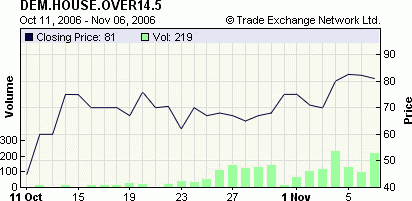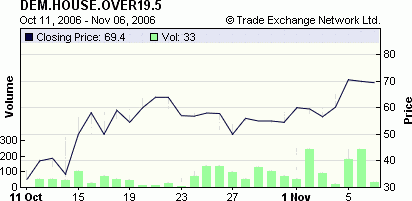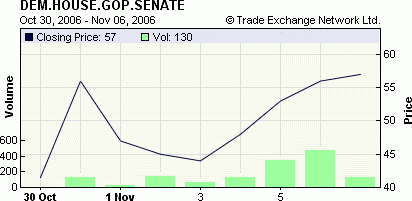My last pre-election Intrade newsletter
My last two haven't been published on Intrade.com, and with their personnel shuffle I mentioned, I can only presume that they were e-mailed out. The following was the one I submitted late Monday night for release Tuesday morning; I'd have posted it here last night, except that I was felt half-dead yesterday and had to go to bed not long after coming home from work.
I'm going to do at least one more for the post-election analysis of how well the markets did. So far, it looks like the individual Senate predictions were perfect -- except Virginia, which is still to be decided. If Virginia does go to Democrat Jim Webb, then every Senate contract would have predicted correctly, with the Senate.GOP.2006 and Dem.House.GOP.Senate contracts being wrong. Also, that would validate the very high activity in the Dem.House.Dem.Senate contract.
So without further ado:
AND DOWN THE STRETCH WE COME!


We're finally at the day of the mid-term elections (by the time this is published). Monday night, Dem.House.Over14.5 closed at 81, and Dem.House.Over19.5 closed at 69.4. Since those contracts' October 11th debut, they've shown traders' increasing confidence that Democrats will win enough seats to regain control of the House. The contract prices for the Democrats to pick up over 29.5, 34.5, 39.5 and 44.5 seats show that Democrats are unlikely to win a super-majority to override presidential vetos, but traders are betting they have an excellent chance at majority control and thus control of committee chairmanships.
Just over a week ago, Intrade introduced the new U.S. "2006 mid-term election parlay" contracts. They're based on the four combinations of Congressional control: two contracts for both houses of Congress being under one party's control, and two more contracts regarding how Congress may be split between the parties. Perhaps these were superfluous because of the other available contracts, but they do simplify things for traders by combining two contracts. And, after all, markets work best when there is a variety of choices. Judging by the extraordinarily heavy activity, these were great choices to offer traders. As of Monday night, over 1900 contracts of GOP.House.GOP.Senate had been sold, nearly 1800 of Dem.House.GOP.Senate, over 2500 of Dem.House.Dem.Senate, and very surprisingly, over 750 of GOP.House.GOP.Senate.
I say "surprisingly" because with House.GOP.2006 down to around 20 and Senate.GOP.2006 still hovering around 70, people might bet on the reverse of one, but one wouldn't expect a lot of people to bet on both. The two contracts predict about a 6% chance that the GOP will keep the House but lose the Senate. That corresponds to the GOP.House.Dem.Senate price, which has closed anywhere from 2 to 6. Though highly improbable to expire at 100, the contract is still somehow interesting enough that people have traded several hundred contracts of it. Traders' prices put the probability of the GOP retaining control of both houses at anywhere from the teens to the low 20s – not very probable. Traders think it's more probable that the Democrats will retake both houses, although that contract's price is only in the mid-20s, so it's not significantly more probable.
Of the four, the contract most likely to expire at 100 is Dem.House.GOP.Senate, which closed at 56 on Halloween, dipped to 44 on November 3rd, and is now back to 57. That's not a very solid prediction of the most likely outcome, though, is it. That's because traders are also looking at the GOP possibly retaining full control, or the Democrats regaining full control. Those outcomes are less likely than a Democratic House and GOP Senate, but still interesting with a high enough probability that people are willing to wager money on it (indeed, the highest volume is in Dem.House.Dem.Senate, showing traders find it the most interesting outcome of the four). This illustrates the superiority of prediction markets over simple voter surveys: anyone can say anything to a pollster, and there's no incentive to go out on a limb and express a possibility one thinks could come to pass.

KEY SENATE RACES
Let's do a brief rundown of the important and/or close races that will determine which party controls the Senate.
Maryland: The MD.Senate06.Dem contract closed at 74.8, which in prediction markets is a very strong prediction of victory. Polls show that lieutenant governor Michael Steele, a black Republican, has continued to bridge the gap between himself and Ben Cardin, but the contract prices indicate that traders don't believe Steele's efforts were enough. It could be worse for Republicans, though. A Democrat will win the seat of retiring Democrat Paul Sarbanes, so while it isn't a seat pickup for the GOP to negate another Democratic victory, at least it isn't a seat loss for the GOP.
Missouri: At October's end, the MO.Senate06.GOP contract was in the 50s, and the MO.Senate06.Dem contract was in the 40s. In the last several days, they've actually reversed. This could be a win for the Democrats, a must-win race if they're to gain control of the Senate in addition to the House.
Montana: Polls show this as a close race, and incumbent Republican Conrad Burns has been urging a big Republican voter turnout. However, since mid-July, the MT.Senate06.Dem and MT.Senate06.GOP contracts have predicted this as a likely seat pickup for Democrats.
New Jersey: Republican challenger Thomas Kean's campaign has been broadcasting commercials painting incumbent Democrat Robert Menendez as unethical and corrupt. Menendez has countered with charges that Kean is too close to President Bush. In a heavily Democratic state, the latter has been far more effective: the NJ.Senate06.Dem contract closed at 87.8.
Ohio: It's hard to believe this was a battleground a couple of months ago, with the NJ.Senate06.Dem contract's close at 95. This is an important pickup for the Democrats.
Pennsylvania: Another important pickup for the Democrats. The PA.Senate06.Dem closed at 91, so traders are effectively sending farewells to Republican incumbent Rick Santorum.
Tennessee: last week the TN.Senate06.Dem contract was in the 40s, but it's fallen to the teens. Meanwhile, the TN.Senate06.GOP contract has spiked to a close of 86.7. Assuming that the Democrats were going to win Maryland, Montana, New Jersey, Ohio and Pennsylvania, they had to win both Missouri and Tennesse.
Virginia: Before, it looked like Republican incumbent George Allen would keep his seat. Now the VA.Senate06.Dem contract has surged in the last several days, to a last close of 60.9. The VA.Senate06.GOP contract has commensurately tumbled to 39.8, reflecting traders' belief that Allen's recent campaign tactics (excerpting anatomically explicit passages from Webb's books and accusing him of plagiarism) have backfired. There was also a recent incident of a Webb supporter and known political prankster who pushed his way toward Allen at a campaign rally, which wasn't caught on videotape, but Allen's supporters wrestling him to the ground was captured (and subsequently broadcast all over the Internet).
Conclusion: wow, did a lot change in the last week! Democrats needed to win both Missouri and Tennessee, assuming they didn't win Virginia. Now they have a good shot at Missouri and Virginia, and the latter will substitute for Tennessee. Two-out-of-three will give them the seats to retake the Senate (assuming all other races go as predicted).
I'm going to do at least one more for the post-election analysis of how well the markets did. So far, it looks like the individual Senate predictions were perfect -- except Virginia, which is still to be decided. If Virginia does go to Democrat Jim Webb, then every Senate contract would have predicted correctly, with the Senate.GOP.2006 and Dem.House.GOP.Senate contracts being wrong. Also, that would validate the very high activity in the Dem.House.Dem.Senate contract.
So without further ado:
AND DOWN THE STRETCH WE COME!


We're finally at the day of the mid-term elections (by the time this is published). Monday night, Dem.House.Over14.5 closed at 81, and Dem.House.Over19.5 closed at 69.4. Since those contracts' October 11th debut, they've shown traders' increasing confidence that Democrats will win enough seats to regain control of the House. The contract prices for the Democrats to pick up over 29.5, 34.5, 39.5 and 44.5 seats show that Democrats are unlikely to win a super-majority to override presidential vetos, but traders are betting they have an excellent chance at majority control and thus control of committee chairmanships.
Just over a week ago, Intrade introduced the new U.S. "2006 mid-term election parlay" contracts. They're based on the four combinations of Congressional control: two contracts for both houses of Congress being under one party's control, and two more contracts regarding how Congress may be split between the parties. Perhaps these were superfluous because of the other available contracts, but they do simplify things for traders by combining two contracts. And, after all, markets work best when there is a variety of choices. Judging by the extraordinarily heavy activity, these were great choices to offer traders. As of Monday night, over 1900 contracts of GOP.House.GOP.Senate had been sold, nearly 1800 of Dem.House.GOP.Senate, over 2500 of Dem.House.Dem.Senate, and very surprisingly, over 750 of GOP.House.GOP.Senate.
I say "surprisingly" because with House.GOP.2006 down to around 20 and Senate.GOP.2006 still hovering around 70, people might bet on the reverse of one, but one wouldn't expect a lot of people to bet on both. The two contracts predict about a 6% chance that the GOP will keep the House but lose the Senate. That corresponds to the GOP.House.Dem.Senate price, which has closed anywhere from 2 to 6. Though highly improbable to expire at 100, the contract is still somehow interesting enough that people have traded several hundred contracts of it. Traders' prices put the probability of the GOP retaining control of both houses at anywhere from the teens to the low 20s – not very probable. Traders think it's more probable that the Democrats will retake both houses, although that contract's price is only in the mid-20s, so it's not significantly more probable.
Of the four, the contract most likely to expire at 100 is Dem.House.GOP.Senate, which closed at 56 on Halloween, dipped to 44 on November 3rd, and is now back to 57. That's not a very solid prediction of the most likely outcome, though, is it. That's because traders are also looking at the GOP possibly retaining full control, or the Democrats regaining full control. Those outcomes are less likely than a Democratic House and GOP Senate, but still interesting with a high enough probability that people are willing to wager money on it (indeed, the highest volume is in Dem.House.Dem.Senate, showing traders find it the most interesting outcome of the four). This illustrates the superiority of prediction markets over simple voter surveys: anyone can say anything to a pollster, and there's no incentive to go out on a limb and express a possibility one thinks could come to pass.

KEY SENATE RACES
Let's do a brief rundown of the important and/or close races that will determine which party controls the Senate.
Maryland: The MD.Senate06.Dem contract closed at 74.8, which in prediction markets is a very strong prediction of victory. Polls show that lieutenant governor Michael Steele, a black Republican, has continued to bridge the gap between himself and Ben Cardin, but the contract prices indicate that traders don't believe Steele's efforts were enough. It could be worse for Republicans, though. A Democrat will win the seat of retiring Democrat Paul Sarbanes, so while it isn't a seat pickup for the GOP to negate another Democratic victory, at least it isn't a seat loss for the GOP.
Missouri: At October's end, the MO.Senate06.GOP contract was in the 50s, and the MO.Senate06.Dem contract was in the 40s. In the last several days, they've actually reversed. This could be a win for the Democrats, a must-win race if they're to gain control of the Senate in addition to the House.
Montana: Polls show this as a close race, and incumbent Republican Conrad Burns has been urging a big Republican voter turnout. However, since mid-July, the MT.Senate06.Dem and MT.Senate06.GOP contracts have predicted this as a likely seat pickup for Democrats.
New Jersey: Republican challenger Thomas Kean's campaign has been broadcasting commercials painting incumbent Democrat Robert Menendez as unethical and corrupt. Menendez has countered with charges that Kean is too close to President Bush. In a heavily Democratic state, the latter has been far more effective: the NJ.Senate06.Dem contract closed at 87.8.
Ohio: It's hard to believe this was a battleground a couple of months ago, with the NJ.Senate06.Dem contract's close at 95. This is an important pickup for the Democrats.
Pennsylvania: Another important pickup for the Democrats. The PA.Senate06.Dem closed at 91, so traders are effectively sending farewells to Republican incumbent Rick Santorum.
Tennessee: last week the TN.Senate06.Dem contract was in the 40s, but it's fallen to the teens. Meanwhile, the TN.Senate06.GOP contract has spiked to a close of 86.7. Assuming that the Democrats were going to win Maryland, Montana, New Jersey, Ohio and Pennsylvania, they had to win both Missouri and Tennesse.
Virginia: Before, it looked like Republican incumbent George Allen would keep his seat. Now the VA.Senate06.Dem contract has surged in the last several days, to a last close of 60.9. The VA.Senate06.GOP contract has commensurately tumbled to 39.8, reflecting traders' belief that Allen's recent campaign tactics (excerpting anatomically explicit passages from Webb's books and accusing him of plagiarism) have backfired. There was also a recent incident of a Webb supporter and known political prankster who pushed his way toward Allen at a campaign rally, which wasn't caught on videotape, but Allen's supporters wrestling him to the ground was captured (and subsequently broadcast all over the Internet).
Conclusion: wow, did a lot change in the last week! Democrats needed to win both Missouri and Tennessee, assuming they didn't win Virginia. Now they have a good shot at Missouri and Virginia, and the latter will substitute for Tennessee. Two-out-of-three will give them the seats to retake the Senate (assuming all other races go as predicted).


0 Comments:
Post a Comment
Subscribe to Post Comments [Atom]
<< Home